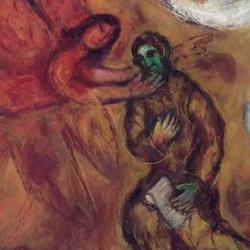A year ago, I observed the shift from singular “Servant” to plural “servants” within Isaiah 40-54. Further work has revealed a larger pattern.
ebed, “servant,” is used 42x in the Hebrew text of Isaiah. The distribution of the word is significant, It is used only five times in the first 35 chapters, prior to the narrative center of the book. Three of those (14:2 [2x]; 24:2) refer not to servants of Yahweh but to servants of a human master; both uses of the word in 14:2 are plural. Within the narrative, the word is used another 5 times, four times in the plural with reference to servants of a human master, twice in the singular.
Twice in the opening 35 chapters, Yahweh refers to “My Servant,” first to Isaiah himself who goes naked and barefoot as a testimony to Judah’s coming exile (20:3) and once to Eliakim, steward of the house of David (22:20). These set up for the promise given to Hezekiah during the siege of Jerusalem, which is based on Yahweh’s commitment to “My Servant David” (37:35).
Within the first thirty-nine chapters, then, there is no reference to Yahweh having servants, though he does name individuals as His own servants – Isaiah, Eliakim, and David.
As can be seen, three-quarters of the uses of ebed in Isaiah occur after chapter 40. Again, the distribution is significant. The phrase “My servant” occurs 14x (41:8-9; 42:1, 19; 43:10; 44:1-2, 21; 45:4; 49:3, 6; 52:13; 53:11), to which one might add four references to Yahweh’s Servant as “His Servant” (44:26; 48:20; 49:5; 50:10). 49:7 refers to the “Servant of Rulers,” which appears to be the same figure as Yahweh’s Servant in the rest of the section. For the most part, the referent is not explicit, though in several cases “Israel” or “Jacob” is designated as Yahweh’s Servant.
Between chapters 40 and 53, ebed is never used in the plural, and 53:11, the promise that the suffering Servant will justify many, is the last time in the book that it is used in the singular. Between 54:17 and the end of the book, the words is used another 11 times, all in the plural (54:17; 56:6; 63:17; 65:8-9, 13 [3x], 14-15; 66:14).
This distribution of usage isn’t a sign of multiple authorship. It tells a story. The suffering of the Servant has borne fruit in a multitude of servants. At the beginning of the book, Yahweh has no company servants, but only an isolated servant here and there. The faithful suffering of one Servant decisively changes things. By the end of the book, Yahweh has servants, and only Yahweh has servants. A book that begins with a vision of Yahweh surrounded by seraphim ends with the promise that Yahweh, acting through His Servant, will gather His own royal entourage from among the nations.














